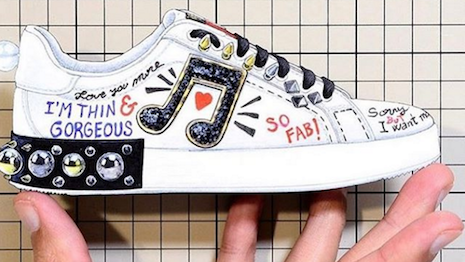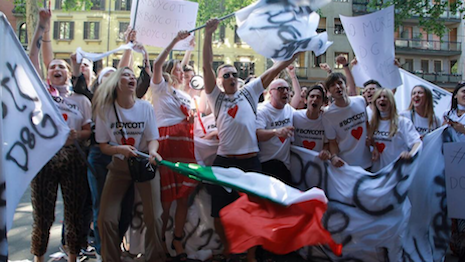Italian fashion house Dolce & Gabbana is staging a protest of its own brand after numerous negative press occasions.
The Italian brand has occasionally found itself under fire for not taking a politically correct positioning to its marketing and merchandising. Eyebrows have been raised based on Dolce & Gabbana’s namesake designer’s personal opinions, comments on body image and who wears the brand’s clothing.
"Dolce & Gabbana is the perfect example of latter day 'non-brands' that reflect a culture of managers whose parents never gave them enough attention,"said Rob Frankel, branding strategist & expert at Frankel & Anderson, Los Angeles.
"There's no brand strategy, just ploys to get more and more attention," he said.
Mr. Frankel is not affiliated with Dolce & Gabbana, but agreed to comment as an industry expert. Dolce & Gabbana was reached for comment.
#BoycottDolceGabbana
In 2015, Dolce & Gabbana incurred the anger of a number of popular celebrities after its founders Domenico Dolce and Stefano Gabbana got into an argument with British singer Sir Elton John about same-sex families.
Sir Elton took offense when Mr. Dolce made an insensitive comment about in-vitro fertilization, and he immediately launched a boycott of the brand. The boycott was picked up online by a number of other celebrities, who at the time asserted that they would no longer wear Dolce & Gabbana (see story).
Earlier this year, Dolce & Gabbana took the controversy over writing on the side of a sneaker in stride.
The brand’s designers were accused of being insensitive to women who may suffer from eating disorders or struggle with body image. The fashion industry is often accused of not being inclusive to all body types, preferring only tall, thin models rather than including women of all shapes and sizes.
Unlike the time Dolce & Gabbana was called out for naming a pair of shoes, “slave sandals,” the latest issue with the brand’s design is written on the footwear itself.
For fall 2017, Dolce & Gabbana decorated a pair of tennis-style sneakers with studs, sequins and phrases written in marker and pen. But, one of the marker-written phrases says, “I’m thin & gorgeous” in capital letters.
 Dolce & Gabbana's fall 2017 shoe brought the brand negative attention. Image credit: Dolce & Gabbana
Dolce & Gabbana's fall 2017 shoe brought the brand negative attention. Image credit: Dolce & Gabbana
In response to negative comments, Mr. Gabbana replied by saying, “u think is better to be fat full of hamburger??? Stupid” and “darling you prefer to be fat and full of cholesterol??? I think u have a problem,” among other statements (see story).
Dolce & Gabbana’s most-recent transgression revolves around dressing United States First Lady Melania Trump, an act many high-end designers have avoided since they do not agree with President Trump’s politics.
While accompanying her husband in Sicily, Italy in May, Mrs. Trump was photographed wearing a Dolce & Gabbana jacket reportedly costing $51,500. Many on social media felt that Mrs. Trump should not be wearing such an expensive garment as first lady because the jacket’s price tag is slightly less the median household income for U.S. families.
The ever-outspoken, Mr. Gabbana proudly shared the photos on his personal Instagram account with the hashtag #MelaniaTrump and tagged @FLOTUS, as well as included heart emojis.
Similar to his approach during the skinny sneaker outrage, Mr. Gabbana then reposted international headlines smearing the brand and its involvement with Mrs. Trump. The Italian designer also thanked The Independent for coming to Mrs. Trump's defense, as she likely used her personal wealth to purchase the coat despite having a wardrobe allowance provided by the White House.
Now, Dolce & Gabbana is getting the last laugh by taking the bad press and turning it into a marketing opportunity, because, after all, no press is bad press.
On the Dolce & Gabbana Web site, official social media accounts and Mr. Gabbana’s personal Instagram, the brand has shared #BoycottDolceGabbana content and merchandise.
Dolce & Gabbana’s boycott hashtag first appeared on social channels following the spat with Sir Elton in 2015.
When consumers visit the Dolce & Gabbana homepage, a video automatically begins of a staged protest. A large crowd, chanting “boycott” are shown holding picket signs and Italian flags while green- and white-colored smoke bombs go off.
The crowd all wears the same #BoycottDolceGabbana white tee, being sold by the brand, and Mr. Dolce and Mr. Gabbana are shown in the middle of the protest being interviewed by news crews.
Dolce & Gabbana is selling the protest tee for $245.
Some comments on the protest-themed content agree that the political correctness of today’s Internet culture is often taken too far. But many Dolce & Gabbana followers have voiced that they disagree with the brand’s stance on the topic, feeling that is discredits true protests for social causes and injustices.
Making a statement
Fashion brands may skirt controversy in their advertisements as a way to catch consumers’ attention and make an impact, but sometimes these efforts bring public scrutiny.
In 2015, Saint Laurent Paris, Miu Miu and Tom Ford came under fire from Britain’s Advertising Standards Authority for ads that were deemed to depict unhealthy or indecent scenes. These controversies can help bring a brand into the public eye, but are they more helpful or hurtful?
Dolce & Gabbana’s 2007 ad featuring knife-wielding models, for example, was banned by the ASA for glamorizing violence following 166 complaints, including one from Mothers Against Murder and Aggression, according to The Guardian.
At the time, Dolce & Gabbana said the ads were based on paintings from Delacroix and David, and were meant to be theatrical. While the ASA did not take action on the complaints, The Times—the publication that ran the ads, said it discussed the matter with the brand (see story).
With all of this in mind, should brands strive to be politically correct to avoid angering and alienating their consumer base?
"[Brands should be] not politically correct, but politically agnostic," Frankel and Anderson's Mr. Frankel said. "Politics has no place in business."
{"ct":"R\/DMEqWHzKv07yk50eg1whmBdArGPIQbbwyoVJXlU8cR+b2BfmPcK8C7qs7YCfhn5LpcO7ozWIwo3gvcY1Lh37Fkg4wLag4j7WIIlfmTk3CUWP2oC42qO2kPUEmgIJdfKXv9P1eN8AhZKOixUsCKLCaWRTfwikgb0k2OI8Txkf6lOlg5lNKvKMWft1JJNQzo5Nv5bIbIkk9fXzeFyPlWZnYV1YBncVSkyVRZKtAsQBideUmmeUI9\/2H3uta4xvpDTe77ZBN3ph0redVI2nouwDJqb4njfiDuBAXP6arxwfuYeqYaCrT5ao9MjLN6h2qBNEPEt3F06VM57wtmVoowoFL1cE8+ixhZMwlOsw6RqD91gQWF1jQerIk78VPw6GbJdOK\/15cxQ96ML5Bx5QP1FEEmV+F37IEMDqoqIxC\/1DS9ATMhPwNgM51fxoiil8jNBa7eucCrFK4pPPUruOYRiXYWwaLxVTFWm64Eo48J8Ydtg9piooYfuvTiSaHVWfXSE9cpaPB68IktROqYLoyHE8cPvnNyw4Mnw9dSAK\/BftohdLwJ7cN2o7OtggidBKzkMgkL0sSAE67RFCg73nVh16ph8dG6i9zhAg+eATRI3eaIjkod1wm318SSmsTlT1OvyvMfJ+CqtVLILKy0dUFaWdktQTpjLEHUA5VuNkc0Agnbg\/JUQm1I10i2447W0QC3i2NB5sNOHjbJoSpMF2ZAoDVvUObVkzzsYZwXvnWYl9j+8lb45z5k\/EOe\/0V2QbWzXbAGJPu7rs83fbyUTCcjac6ir1j9TpURalwmpMqJpvSr5upTHsNLcDOWVgDPty9bYACHbAjL4iAY3TqZWuSA2G5+vhvubzKog5BBn2Z+4ARoCkWOQE8Ou8vKPFr2rcilJS1sxO1O9yOOuC+DnIDA5tpdCn3kMkJNEi\/ZKX0AVEm7foOg3KBO8mxdqhZOY92JVSYl2HBfksFcOgGMbz7ozMksT63sa+IU++MkrpKLLvdLdiFAYFutJUSLLH2ySLeVahIPtm43z+0h0FGoyqcMx0MFhhATVp\/hUlo92i+GyybCB+ohRTLNJcLO8VNLpqeNP+CnZCXBY8Czjuw19KTFf1HLYFxjhDCjOmTf3dYVVLtpdjrqFidufh8VOEDMGDQN+09einnEuJD78lIhfdv1Oclrw9euZbSIJMoo20w5yq\/SNq8MixcMgRifNWnn20F01LOZdicZxyf455hLqll5oi3W4CvHkLKfahKgkWh2L8n2p9Mm4VpiKBLcGj2aW1FQtBwUS6LW6PmwSdaDqSsQKyEMZfkWVBTunMyuc3537gQAXxQrBPi4KilNJ7p1k3r7vf0Q3NL8w6jm8a6CuUVIaqXda2aJu9pH9paMQoNUFFy+jIj0hncSOvWgcDTqhCIurubCdSZs2b6JKSm3JXYGu1lNGRyHK3VHbMxci5AKR7b37uiVaNldcCQRmDHcTqXDXuFpOd8kCMNT8rw\/OQFKBYjPMWtx+vsytDCPThqIl7f\/dgBqfo4rgPRKl1Kojkv2MXHcKP1ZNe7UA8pEGGoRZGQmW80fiq+Js2sJX+ooHEf1pN3FictrtyB+fV3ROyhPu+rkkKlkBYAdat\/4Kmc80Lg6+yobqZcQPvjJH2d5OidqpbcodJFuE\/RwtJIxK83sYns4CR6aBhk\/psC4FbC2Ab47JatwpANrEQkzdF00sUjpmfRyYORxKF4VCw47CXpUTjNQimXbhxGoiIM56IBJu9qdoxqeaIGJfOgEKfe\/ujcD\/6Y60+kUefye4WPY83lHMLMWcnapOkdwHGO5XnlLNEzHuqYHs1PI5uWY94kNuLfE25CmTrrFQX83H1fzFqy6+Lv9RzsYJkDQNorF3hdZEyiv5jHZaHLsZomWrLrFA5Qg5iV0gZFr3lEebCJQEgz48fJfWMO1ZxvKLcBkH+I78H5zpZ9moV+gvFC6ZbvY55PytT7csbeioDwa6btDF2gljRUEEh+oherqIROvmXLpW+d\/We+UjLFNOHx22eGOFkuOxKys+a5jDeaiMGbx4NbmyG5orYnl9a+GFJOFp8rc1CUkDnPOJl\/GLpcWuNxQ5Fp34iVeGGdf9WeSn7WIqxlMtlmr06ZdWjzAEfEqWeiNNwu81lYeRlLJOcRPnth1TWtctv6isZTFjceW0nNwXYw8E36Sz8oJfiewHkcOo63M6AocUGHBY1r7CgEEgBiXxhDxxJwFSc4VDLSt8NthEtzB8FbYlo+DFXnSRRtVKmXK53UUp1ILvvQWCV4ixqMd0bkfWvNrpkNacKZhJzQFDLq4W+beoaACSaAsN9ydgItOVQrWytml0bFov7pFz8WMkHLDd+Ux+ZSMHsui2muBx6P2z9qWaR5i+JSKIkme80fNCqA0NVGW+06i2kTQ\/s9HeMTLa1yO12hficCwI9vScQnQzXB6lSyoWbYbGYhzSAzrciElM8FiX4m9lIrfSuSHxm4+zEksO6tGl6qb2rUD7gxS+Z7fZ7j8+yrww6uzL\/UsmRaD5692vbXkU8eeGfUz5U6IiVrueuz\/hy3om1ZBjBnlmfq+1SjHgyNeXKi1wOP6pcjE9T4lrH+pwLq68G4kiqgoHea1U9pDpV+g1qglSndB75DnLzcLf38D\/z7NUa+qGEFNwFr+63LiUpJ7aA8jRydFnRxWJlHqhdOvCaxSx5myFFyj14weiPPpDSpGWxbuhmwUHAmvWdjcd381nfQGYwxYuVzYotZxKPwzZ3+RO0lqIR\/7O6Kt56BRBMJSe4VQ9Kw0EUsux4qOtiAL+LRfwn9IqRef2WJDArJYLJqd4EzW5KUuID\/OOHQd33vuOPvXYbJTa2QVe2OH7Ga0FeX18NRmhxWYUfhlDrAa4PLV5+i20c120uwHyPOSWuQoyPC+pS776Pxv4F0u7O8Rdcinplfxyz3SnI2QBUoBpxp6H2V3EsE2ZBpV5RnTM3BPGmjQNxeKAxUybs3SYG\/9DitKkRL1igH2ip1pizuThdwJ+m30uU+6B4b\/93TW3be2oiGcKH00tb+6vbRGSfrjSt9a4sSi16w4z8ivUCQTeXREgGv7APEt10aQo3Km60seRO5GkY6sM0++0Vv1Fi87qDq1WElz2FdEiMocodoXs1lsOqGKJSfGPg4nb41l6+pekqs29ikEud1oIxhqRrv2fVD8kGN59lVFDb0XjOSc4\/i4RGx637YusMXeNGzJCJyNUSfDDrTX6G5S72FvR8i1DqBmhmZLoWJ2hTZHQeDuoYJC\/hs\/LYgDJMZEuAInz9vKOWYFwIZGYu4i3gYqxhRWalSEyaMP4gPdSKAuybZd583\/klTFJcpGlwh49mnrXaZifOFUZd8P2kn8EavoF277JGHX59LoHbdNyk+SEwD39ONzt\/etTvxNJ7AMaegPmphNEFi0zLyt28MfQsDubBP3Wareesvkm8ZYZ0wywUOWG7Nai45SuyBUMq55SXHeyJbAcGbuNcGabj+IRdo0bHUrHwuw6HFxN7VOe0y7otX98dBJ3EYd40GtasepvQwadepn40ogAm\/GjjFuUMHeDrpMp4900Vw93JHkca+iParD1ZWWxJWSLCZHK7RIuoIm4Xi9gkyAeP3j5ocNErpLfVfnk5wMuoNME0Jx058rxEPCMv5ciLdp42JZKbN6GYOup6z77jAV057vqL\/1fVqVbAVuiuqvsmAs50He4UvudB1fWzRiT14ZeGME8h85Dif4rEMbwiULcM7ZlNMNcyhPrOExuFjNR1+8dZU+hZr+P0N9hxyoFkJhZkW78MMeU+Np52vp9g9YUGJrxZ+ZVcLtMIa0zBvHI5uFmrn16VtryJlWGBC7Y\/l5VaO9iaPoE4LWG5ZkF4qjP0C1NB7AHuThHuJKle7VkXOwjwfwapA+6pkZeR4JM8sdU4bItwZBMJy1LBelM9Jj+4rpL2VDXBFXE0FWWjeDJ40rqO+DbQrwNaBnecdI7Pi4J8upbthVpFRFwVl6RJ3iKIj+h4tmK1sAaguFpa6jLZ2x3aEvKhXwF4rTn+acn6B7uRTmpa24ohmnzObLNQ6FRpnpjfBkdWBblGaaDgrhC+2x6M2UNmBWVB4mkxWQEpvSvzcnRvcOLrx1jF+7rgz+XA50+qy99w\/m2LxdWcO\/dGZKiaZUEJWWO3QMAAbVYXkCHzMgTF+F0oF6UaxQ7DIS48\/owmu8\/EdZeZz3c3zTcSSZJN7Ofq4cCcwytwtcN+5Fmm3EpHI7umUeZlo4566m2XjXDWUQgaQH9FCi432iP5ibKToQpQweXzWvHX3LNLoIcMycoTrHCLHjVvN2WBE74mCFPAnSFfJzYhgbp2meo8rgcpNCROLJi5UDF5764OHamgk8RxP8ZTZtHyhxiCLChdMGmxojT1eJZohoph3he2VWP5xsdGCIwSK1Tzz9PTZhKJF46bGxymummUJu3NkFLvo\/mIj5HBXcY8jTCW4Oq1Jk1TvUpW0nrnc1oyr9\/OUDCZrbGQq8WK15lGzYrFv1VM1hao1FWR2M00cNqAzZvSQKh\/2KJuP6QcPfgZk0K4iQVYGFhQHCUDn2sOxLckMub1r5tBE711+\/xIl\/DZ2sBY2l3XHBXqa1NbBDzHDi2p8CfggUfe6\/7acy6v0eC5\/P2a6PgCAW4mV184uYCc86TEpRva8cFBN1UbpWwKFwwKnxMejgVM1I6pZqxt0FiNwS7GzhaXlrxrVxadJ3HeJtFjOPMqktaTj7Okng64jtJUbNsFp67l6lxdXpZ9113Wrqd0bojoARwds9ENeLyq+mcSeEeAvwQuqIKd0MvIpwPMfk+8fDpsv1b59YKetnvgA0bRlzS+RuIXITuzxfhS+\/2sNCDwLFwm\/bbtHKSHMaPm8iVqDE8MvevDLRDCQYMLmeSm4LAw4Iy8Y86SWhutinAlcIhtcr0fINnIum0WZHW7\/7q0BpxYJ5a\/dk11qeZPUXnwfev09UC+NlZkcSF3cgwaUwxCPvPTWwoAxip3OYR4tgonXg0V\/BXZPzc\/BhRORRBhO+uBNLzJ6orT09cZ20uly+UBQZEH+9g641DEaeFIJ2Q1saHNHjF0Bg10hhHasWAdjC3uvbUmZYAhMOx97viJTzY0O2S381wezxPl2FywlCYMtwV9AasqZ7+WcrvGK\/azPmc1ULl1m2kV\/8jXkHDEjhIGYCYXflIZNkKwrc5V8f0yGAMzB1jrx206HnlwRcBkZvcvEGgn1JeikZaaTTZwZ4ttd9u2\/8+fgCHEdjO9XNQMyZSxANt7E6m0SuAh4JhT91qZfP70dwZCgEQHi7tRDBA7Eh27U1N2HPkKSvK8O\/9yfDB9daYmwY36\/ws0N+FyaoZ4Cn4NTt4YLutuulwohqE5wCDftgQkeI4uRdjGe2zM3iVYMzEYaYsGsYGXw0maLJNX9QNYr439krx2TPBYcs71WXgw6lS\/fdAIwLO2FctUxcnrzwCaqQbArnkayNfxqx+vDqvulyeih2t41n3DoJn8o9024LbsGymZoIShYzFsU8HI\/JK3erdDAcxY4qePfXPtBy7UIoSCbEdPAvUSLkcOieZanTHIHpQA3XP9bqGqqTvn1cvEZ90PSG+IoK7ldBYVHr73w7+xoM0xYqBDH6cmdzYop5pD8Wv4O8f8eiq0NnWqwJJE3I89QHkmRNyzcqGNFk+eZomaeUViCQjjkqd0zBj0EMxz2aq20Djcw\/UWTU2r4z6je\/PVfCRtRjYMSoK\/Kb0OE\/XBFL1xVwEmQmD3btEbKjOS6PGU+41HoszZWfSX8Aketz8vrqsfV0xMHr8X8aoVhyqg0E3oZU2jLeV5bjg8Mm+5t9DDMuhyCEy732Qo2ZgmByBXE9QnKyGtq0RN9s+t751h9bQAN8OUSY42Xaad\/KMp2MRchbRX73fwoWqGQDubA3V16KEnNBwRgIBIQE0hBvVoRi1laupqdcA96PWWFHcbSihOs7NoZVFGQVJWgLOA+nKDgaPpQu0eCjNH3b\/ZLqAg\/C4RnAw8qXMai4uTnICEP4olKvdCuNZBDLE6RYh9uZVYQwBdz8CfkSMl3oIKHGteZbPSyZKV2HzueTln5PrFhmDbOmkHMGs6vXBkHVtsruyiy+prZBVL+CQJ66\/XL80A1QuzyQ8F0n1weDcbVv2TP91cDmUm+IO4Sk24MLlGpGqiLtqvqL\/Zies4suirLc8vCWMrE5p7DBxyCirm4yhgnPoS8LOlCt1ieUJA9hRDmMfywnjHMBkfEnNAnQxw3EtcIszdFNFubkhOTEPaM0\/yv8VDuvy0auefoyLNtbYoVRS8LznU39T\/8rkcbztDaW97FYUK6BGqaMdS9DobF9kwbaxk3r3GvZk0\/kSHDkqlCLLRJ7AmbQdPhMJ5bxHeZ\/6NkIDjAWOz7FERm\/\/MrS+UGd4LPCXyrjzmQqdJ0mXEzAd0MQ4wm4VWh8j\/LKcseU2pyDv3jGeCw8qHUZx95tdp97mo3iZ64N4k2ui1sgdv4fw75SFH0xRiFdVjFceKVYfF40hpANpqcaNb7J9TG5WXuuykShF2HdebjZ9wUteRxjTMzTHLx5HhkXeUDwavfkjcqIlxfusZJ6ulOTm9GXfmHqvLZ2NxhfBhA9ZWxdQmGmYctLqiD6r4WsjHTLzh35HQWTQnTCMKrhApxH7nhKbJbbiIHnOk8a9kTfxF4NZyovvNVdWOWqJC\/lruF\/dQ9diTbYguOWfrQnQJvbYvZ1i0yAthTkIE3ao+PuyvE7QOsx\/r4S3JjwB6cR9UkF4hmqY\/mw3CN\/oQ2I0FcdkQePr2UagE+nnIxAaE7E220Atsk6ERbZBCsyjJimp8uepei7f4SF12XP7HPBGWeAHYYvK3mzr5V6iZK2JPHCNdXzc8r1BGYHrwkpwCj2LhIKteSGz9LNV3iqUBBLyh5JnANT+309aA2bYoX0Dq5Nr5l8+3kY3npxn24fqL\/bFx098FmusZSLfSgy0IBffsb3OtHIenAan9zA+DDGDc+90\/MvNpfx8QuTBGAiV3IciNqrqKlbEStZnBjFimp\/+EVL0DpZV+V1YtUxBwDUjk7R6m1irHxVMlI6uK0g\/RBY+WgwXYsrxUz+HwpKZ5aHlcTpcfR5PZX7kl4nYNcebrA6glOs8bxXeLk\/Lo+2+TlDQ7rtc2ufzqbrx2f3d8HemJ2VhmfmZ7GUcjkgLfgm\/EZtKHPm0Sc8L3NVqshOu5ltf8Gfa19eJBQi6\/27x79jo9r7n7J3rTvnBSNbDi8ZMvONg0mChdtwj8cigcBUjruufwB+Xu0GSQ4aSWJILuaEJIMtDldh7+e7XbA3N4o3Qc7A6iM9CdHMekO4fa6fEYQBqgRvK1rYLGAPk\/gcVQXnwZo7oXSBhYzyOAYyTqoyfnm7UaUfsVoAzC2Ir95EN7gTiuHYKBVdL3TNbRZcQQUDIU\/PyaaSnQN6DW\/3Koy5SS4zIgFgNpksQljbCdBS3ibqgZD60zfNpi45cpLqw7Feke86gJVWRznA4e+IKHEHbNoOs2m2scl8qyLxiGeXC4KINK3py8K0WqJBYCiPUELPpjk\/tLMFHYDrDRgaM0QbQvJsoJNNFze8VIhgBSkgEg73c7sNQGZ\/dLATKdV7nSy6gJnVmu7roER\/Rxb3e3c3eyXEhvXTHUHmJz6V+Cl+gJ1AAGcwr6Y\/\/Y+A+UdHVNWFXGxYPyhY1KP940DbjaxEIyRw539NQsautyTPcnJ3aXlmWBLuVyR7G1uh8ChmEguezBBNVd1aEs0hjrC5fp9EOA39CgpY5uWCPuNLpyAQohOaJV8ovazwugmCbI+tEXw3duB17xuBaHcVEI\/rHX9z4Mp4GLRBDKS5XuQWSlShzQ1V60ANUgIsSOEH05AbcJKVHHp7Q4845fNLzuSXBvcUMMYhJLOCgBISOcQOS5XoDxX31Q8n7PhJRCvpyfHp9d+D1OynugjcL1Kt0A1qq0X4ZZ+qQAmQkMWNfl6QMXQrwxKooVYh6qfWOPv\/VPwvR8RKDqyVuHPRfGa\/FU+vCgQ38JXgSAxCscFNzISXZQWGytVfFt1pWNnffxXPQh1IOx3SKgRSYCU3Qnk4i96W841GNDdPWwrWqLHLj5ZgjImj0FjmYAGIeXlh8VL7VlZQZonJ9NCcIqQxMTb7eORL25beCWFwm7IvvfbmtgkcDkXeEKlPp53LrexNtmF8CyMq8g3kk2NRWo0ZKBHR7lnUk3YoBEU4L0tNap2JgTo00fb1eNSG49vEK1qSeoNvfs58SbJ7DSp8NhIrT4WP34bWBhm0N6wn5lgsDRi8tCNn+tkn0IlymcqchuiqUVGue2IXFcGrr\/0r+m3gYdUr8kANwea7E9OkhyFJKHN+FOKDRxE0nqS0YJhwWHaHM4KLXBGTvlsOHCTlZK1emFtT9r0lffvdyTzOK3WMSqwW0KVuAeOxco0PY9uekIU0lGr3tAOOKsFONaDoWj+ii4ASdlQK\/OV7Yps5i0DDLoVe7bQtvDtApkn\/Y26UxqPPuITCPZ1I93rZK3Unl1fAZUELwRx0Ep9dWqtUj51mwMCJRoJknwS4HCxnjpwUtZqw2bWiddk\/M5K8CXLv5sROKV8fLbca3ixVU+uXtP0eReyWp65EDKJhsfJn10Npa0jrF3TcTWNEAAoCbZh6\/EG3rgLy8cjro3B312KHDYVUUgakH3zCapQikekPVR4ys\/Kmsj9YFWHvBix18VA1UTeo4kYRdJC\/HPtlv18LgjGJ4lungxwbxiqfUU0Jzh\/I0uLtqOygB2RgmMe5sYjwq8OD9XKVZmS3R8Q9NMsNlKzXFCSrZRQ39Wb57Vp5mL81TiY\/eStXUEB04Ytu1w11wVJ5CKmwNxxoEhDF1f8iJuEnkna+AvSCcbivpQlqOli8f9Prml\/GpqrdW4ZK6pQiu61H4Een2Nb073\/Gg6MVG5FQFw7Dp8rUfaMI7yI2QqPG4jkZAIQXhHRYlmuiOBaBa48le4Te6Od+PiW8hLDvIJXf1JvoiarG93smEV8tZl2J9sVkeoyu7N51bdGlgSU2GJAP+SVgKmsyuflPYST+65WBguio7aD0pEnPjLVjuLdsNN9K+BsK6CsbRjnzEJGvq+HhGTpeeMYccYf2Hfzugd9B+Nu3+P16k3jE4Xor2L\/3OxLNFvb2Re1NpfRWqXh\/MQY4VsValbyfdD5kyfPCqGeYgfSyHznLRABf5L5AUM0Id8VBKSFrsgrlwUllIbamKtv8r9zMoP\/rRMtB\/1jwgyRX7Ig0CvrkSbzBHJrZA5N7ZiY+XWESfrB52KFVVuQn84jIk41imv59OaaCZtjvf4+IMg3XEIzSkRuJwaSTpB4L332\/KiE6OlbjZLwTyFR5OPuMI8kINvXRFAy0B\/qyqXNbe6Q\/e6UDVvrzfI5oBEb9Rfu2KzTk5cXkrIykxPqtDsCZdcQ2y45hgL\/PO4HS340W5H1w2ylNCB\/9xkX5KtkbioWhq23x6uswuiSFHpg3yxqAmk+RG5SdhaVUMGYDF6OOt+\/5NFBfP1WYjNailyFuFDzU5w5zdgIG5QIIP1uPZDszM+fnN+uWpPl6n4mcuekqNwmJERQ7L952DFEXFJl8KLE9txNGTS6+lL4W3OPD1k7qihTVma36JZ+1658GXaplKv86aNmbLlpi66mjMfXpKtCNDxH17sYzgSF\/dU9bqTV1hh3zZjj7ejcAJ6YWnPPFg2j1saDLukLts9CZc3RYc8ykRlqjNpmTZgLmBC5d0Ig0a3hM4S2CRZJ4r4UvF7a5etttDIUD2vzB6CTEefg30fupHrPvr2jLePo+XbkzzXSqAUicvett1iEYZZhFZlNOrCEuNafiV20F+odGWyjevqlm4CU6bFdUx7x3kxOiA4lpKiAMTQBBgNXZ8SMOIQb5CwSTavRs39Ndulk4xZ66lhpMx5ol1KpidsXyGn5TuzIzbj+YbS+dpb3gf6BM6i2j8B2sgHpUYyS2N9RaPiEKD5c7+tOV8Mk4vwA8JldeFexIsPyTESIpDcQBy4pq1aaGQlBhsKtBB7v+Sm+n\/9qPj9KS1DPwL0LhBv1UV8soc7V\/l1\/o6qb6jIs2y2CyrtGx\/tXFiuhL7F32Ip8VSARw3Zs7Oqs3CsPozS9N1JwCniX4JrKuwgVE7MR7QCQemydziwc8xzj\/ASPC6rP60UcMotqMk5eqqszX0zZGt5FnKyuhepZGsRoKC1ZhX7EkPwxgP\/Vx5QEaDJ7fVuL7+M1DXB\/nSukZ7vTUnGUVvYoPbjTR1vg9PtyYfy+vv7ht1NNja5T7pv1+rMRsqaCfsxTnIg6TAanmzQIT8k6c431wQV1TbbxkGNnFCwT85HXhPrBOLqL7TF++07MwwJsvbb6T4m44JaHM0TrjWdMP35RNC5bmgjv3ZdPwYuknZ856i6hXuZRQ2YIJEZNgXCk8bvGA4alTsK+EK1RX77oFb7R3kH0kBtzGA7uRvq7X0yW+B3ZK+c+REbTizfBLrERYH6ObhQKu9leTGQyn3c3nrw8\/QniTQmBvbumfQHpRYGbEIUfRCxs3dOK3afkPhytXpqikSBeY31CGxIUPKjhLbVKfxJcXqAPdukIn1SBVraDUeKKZh2vkB\/4zhEZ5sgkVlsV+VjuswA2mzRiiquaC1S6gUKd6+84CYYGklUxAm6yk1VpnKnfQZWoBpfRr0nI4TmTIuqkqqh5u\/aqmPBRy9KhGoFs6ckuIuw4446Cu2pzilHcZXiG6QZxOTaA5zI67ILttsAxEylCCS2njMwK5EPtQ2xuIpSFoQPQYmRuvuB6SSX8fvSMThNczSz39lOw7\/FLVRWwzieEZAYB0qtOKHRYnb1nF1iK90Obp\/6ymTf9uyQXt1hB2Q\/UJWrFXmft0sPp6pGW\/Q\/FmFQG1bRHAybEF8aaFnGNvuSeJx+kJVclu57E2XRPDCAuyDP0eZ\/FntCkNMty0Ih+Sej\/AUfOn0RdEKwu\/FRZCc+gQmpTfeoTsNWXjUrT+46ykeKvyS3OzEBRbOnI6+WES2L\/fukKiiiM8JtmLJ5cf0OjiFuemTl11RFbKfs9LEIHpgra5k66y6P88dHSOXbLDZUJdBL73PxvJC2HN3LITFwyg3tHjRB+Ba+L6lZYxlRQGFsDEyWmusBeYDdiYf2oMjLc\/nlKXMSNeMiOiwgps63+aa1yNnBedDF+jKf+997tAwFeqXBsHQRV09Olq7Aux580iFNtAXihH+gw\/dcjw9bk9sD1sZwq10QZCQVr+ahsIbZrPcMlh1AL1AsAnpLRVjk6ZDtTaonGg74fEPhUXEbM020xnWd3AxpxfBI03AW28iM+llSWtMg3Om9eglfqtGfyPhNQ6jBh\/KVxsQxNSQ35\/8a5QDCnHxlAPhFcPbFe+\/ZL6OrbCr4Yl\/FvSiNNj3uR\/AV9opXEZEC2nDSjjKoybk+j2knC31coYmmgMRoJWSo9rVV+8yQNCeKlnFkIzvo5rhaxSMkWCj8VZqYxjCTlmD1zYWR2QBMVvMsAMTFvDGHFAed2kkIkEh3RL2mm2CGGjWRZw640Jdynqw6ozmPtJ+3LIQ+StCGoaZTqb3XGo1cRUjZ74iyawadwoC9PLWBhCuc7RaqmTcCKC3NUhMl\/gyxujoBNU02qwkBl5Ei9elctxzZDD0yt\/fStRTOPBZy1WGgJkcPkQA8pZx7KmlHN8RWUxUM8yrSGAoJ1eDSIzceHYB\/CHv3aDO1aJsurS7WWj\/9aHqjgvwJnXgKaRbZksd\/KVF8PMholsPBaPKkFRuwy0w7Wo8wdb+9r+T5NMN+vEc3eOVAPCI4WzYkVCI\/Xawk2JJl2Yw4\/ZQYp0G0cW8v6y9hdvUk59i7B8m24TgcyWp+96Q0NbJqQwi67dNLI83brDKBv1kzpg7LXFPKv0hOtaRdcWqXRz\/S0F3K+X1Ct1rJa\/CyJAhnWUDKPNWIscUWMZ+oB+sZbOt4YFH3avFdNGXTczIoUf3nMkFx7VSKMSVlWVDFIY9YmXpx90fH6+DQ+15DDQCb0sFTcb\/QudodWDjD85cNfdX0Fp3VnJ1ZVhYJADOjgstKP0BvyX+AQgIt8PwDVIVOPMORwf1KR\/ce684Ch7G9OrPnoSt39SWU\/QTQt12LenoB4\/pbyA30md54zbRMPKmOXSFaLWeWCZqEJJN4qa7iK5g3OEg\/ED6HNXZfownaNo26\/ZJyH9GA50UqqwRH5KYhnwYCryghsC\/OOZIqmV78i9PK3mGjo8XRPoBwVvGwX\/DN7zRpXZAyvjEXRDftfhT5AW61WjHftjqfUKyqfd498NGI2ciblcXnRvxuYa3vD+3blPH8kfjUAPf1Bv477vZUcmBWsj0oTaVsIKr\/s5pihm1GOR5pYvV2+O7hOWsM73ZSYgKyCc4nOjr+8i\/11wxkh99Zfomf\/hTprtjkHg07h0MwJo7KlCXh6TFfir9e2kqz7f\/EaQGP4ELwcL99xAU7Blq7Kygav2W+5Z60KTIO9r6YUm9+DTo0ys7d6mrpRDojNdTgvLDPonAiaxXmKdYPXMC\/imsTRsHEljBDJ9XZG2s9luNaaFDoU0E57U4LqEpTJhfwh1MOBBQVc3RpKdZI08KIxFGbQvq7SWByDr1rLDohBzplOHhdvZsrf+4isHIOfdF20edrSVeZkF1K2CuBm7+h9t7QxqbDpwtewlTW78YFDc+liV81kHwcPZeiO5GDoyaFkJbh806Vmbbx7YKXBHuSZvCTXH74Sh276IA3XCTWiiPf05I3lu+hGGctB+1\/NWWf9Eb7ekCVX95XdG9nBDe\/Xn1HtDRM9MfPSnnKrO5yrkJE+QhP5N7ny7IBBahYZbGHXDUQnOgMqVo7BwtfOr1MvIXCQnmWZx99eukIvY3tuzK62Utm2AI5rDHYydpN0vnTv7fNJwa\/joepCOoK0Piuzj5lTGpT5rx\/nfv\/zEJ5OAft\/Tfa1RoNfTV2jayz8CM4dTXh1NBLqETN+VlYET1HHamcvqcVbRsL+SxK2w0pvLOO4oz28zjDYjcRXBPvBNwaMMUHlcsQ3cc8buy8VA3Xc1W3wu+gRCLUIisggLYcNGqXabRfLyY0kMwHGfdSXWki0X7SLR0kFvD2RglphheHbtkF5QckviTbfTXJrU4meW8iBrrs8KidhIGRjVObkItDL6u1jRWMVRVwSlAR+NjEm\/i1E9WnIBIUesXudY5FAT1kdNxwJo65C703Eveda+2BR\/hUZZbQj1Pnn7bKaH4eq4OdbmRXwKCs5Zd80aQZRDJwvEH8\/LYWy6NCDu2LNcJw8AI7KaZnvlZRxEjH2O+SrFwm8QcMeScH+o\/HTJGwXvIIRXtz3vOBXfF3OnwzNqiIfXpmEpcrHfg82AOhop8YhTFFXpce6wMZhKFDloM5aDcjaGJE1uXSvZbADmBz3XlACOZRct5rwSR6xqOmTpSfqYfh1A\/RRmUpxVQNBxBVdwTSXrznhF0S6ZTawpnXZfEPErBpzF3JqgMVj3kcz3RmoFrePU9nFm0VBwwCuKJbaolOcN2yxTyuZg+\/l2rFNzrh6dd2eK\/NEQ","iv":"253120115e3cdde102171fd394ffad98","s":"e227615e8ee0dfce"}

 Domenico Dolce and Stefano Gabbana during the brand's pretend protest. Image credit: Dolce & Gabbana
Domenico Dolce and Stefano Gabbana during the brand's pretend protest. Image credit: Dolce & Gabbana
 Dolce & Gabbana's fall 2017 shoe brought the brand negative attention. Image credit: Dolce & Gabbana
Dolce & Gabbana's fall 2017 shoe brought the brand negative attention. Image credit: Dolce & Gabbana